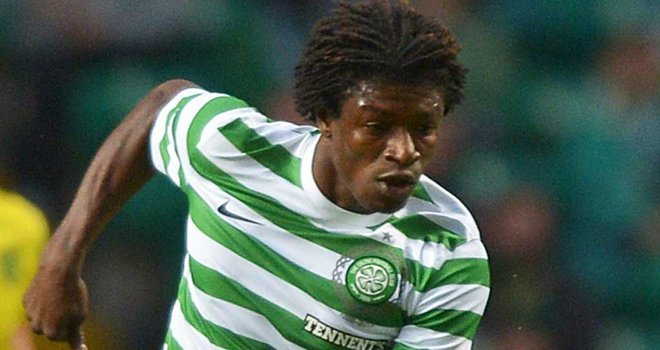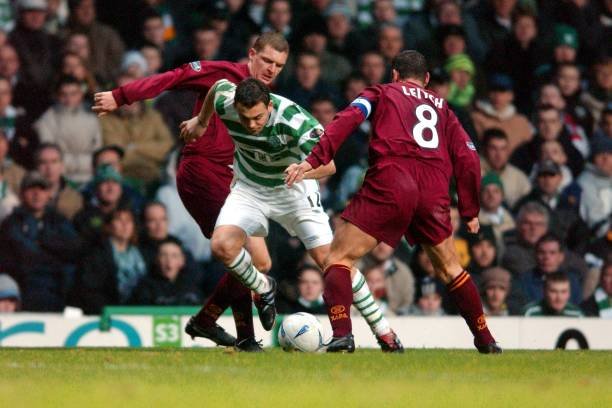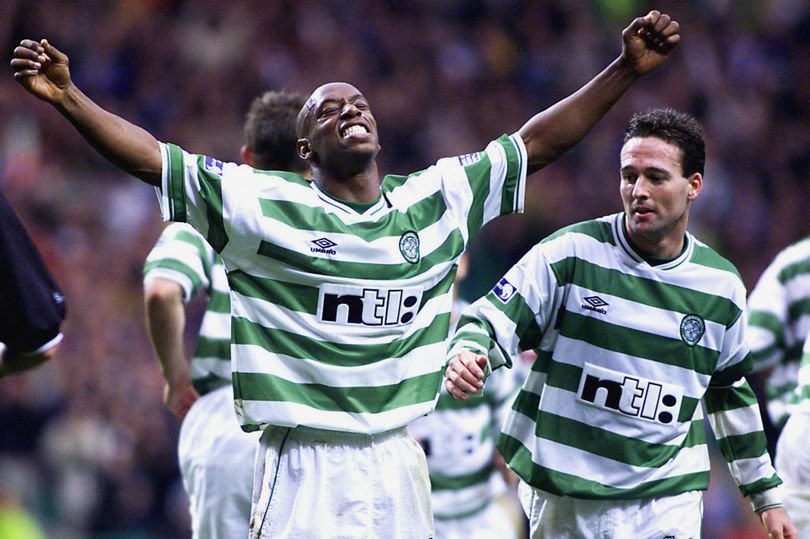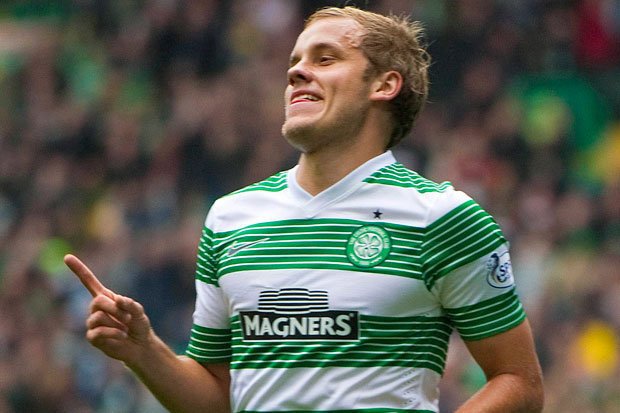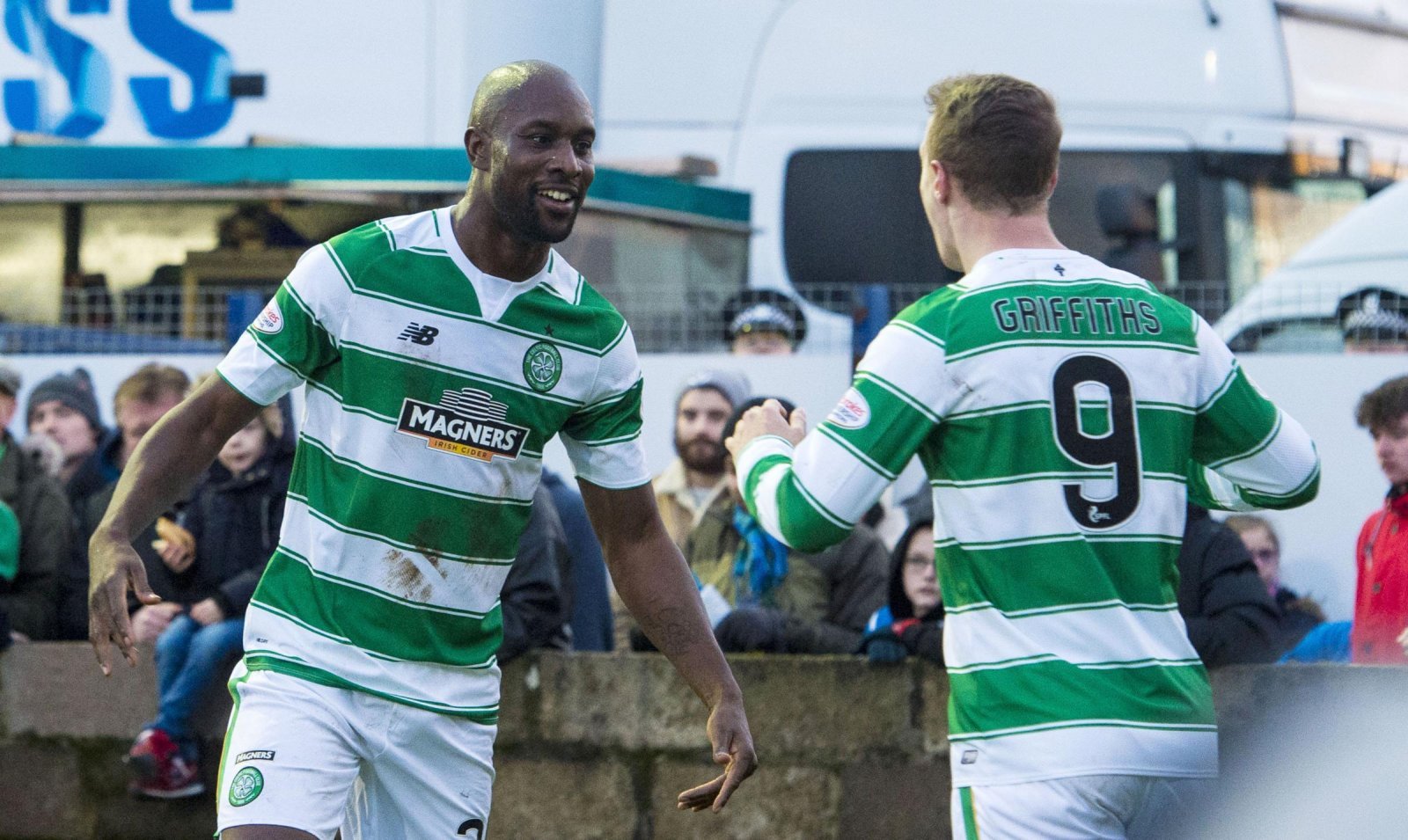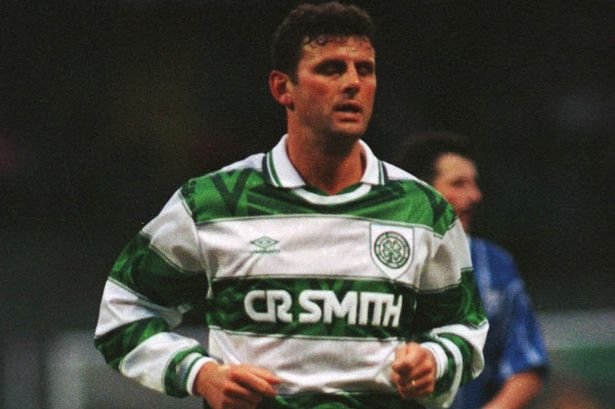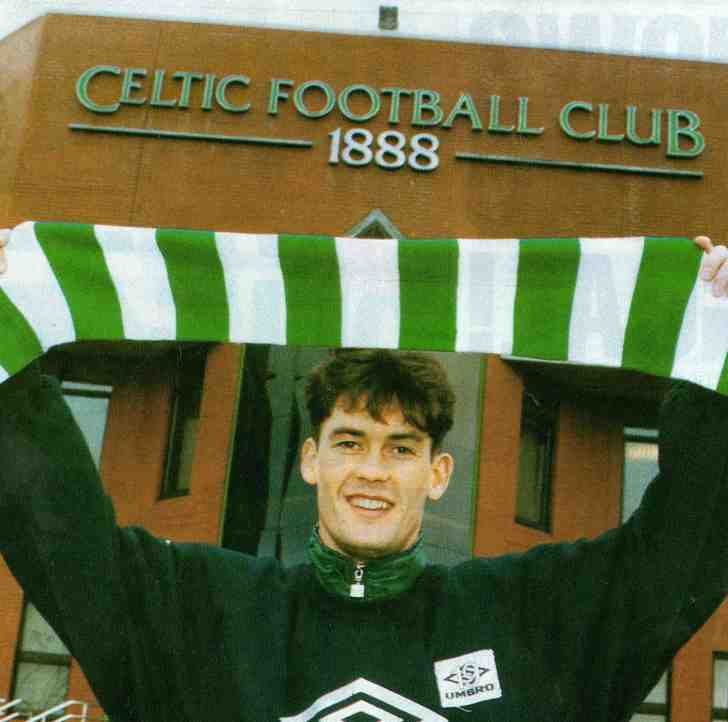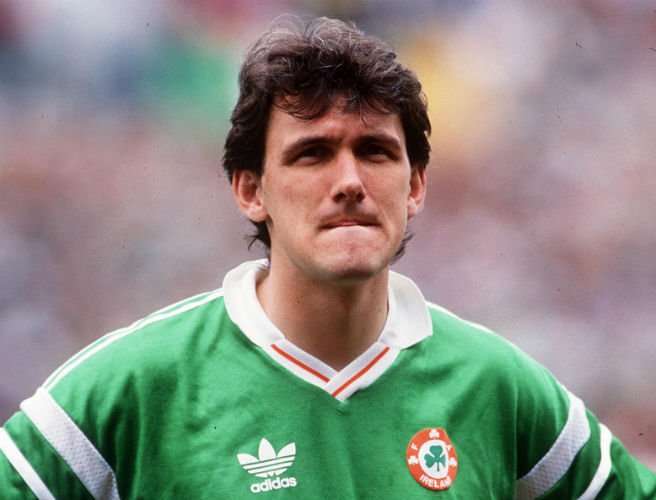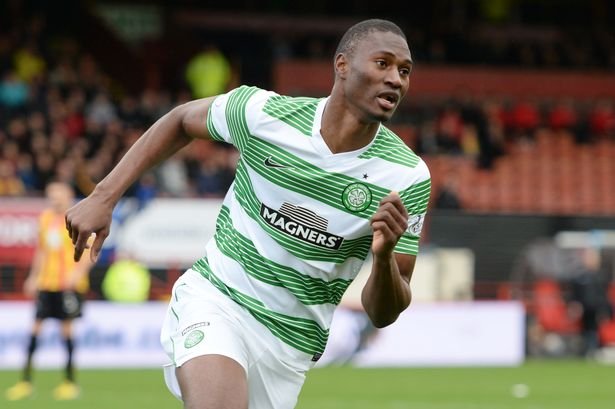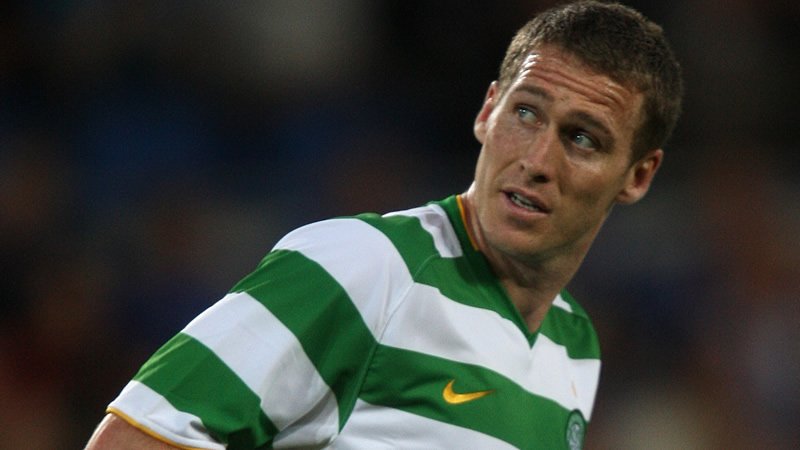Nadir Ciftci. Bye bye.
Back in the SPL, where he found his level, he has talked about still seeing a future at Celtic Park.
But let’s face it, there’s more chance of Steven Naismith winding up in the Hoops.
The big Turkish striker was one of Ronny’s gravest errors. It was the first moment where the Norwegian boss baffled us with a decision we simply could not understand. It was when the doubts set in. Whatever he saw in the guy, it was more than most of the supporters did.
I remember reading, incredulously, as another Celtic blog said he had been the manager’s first choice player. I couldn’t believe that. Ronny was a continental coach. Any time I watched Ciftci he looked one dimensional.
I wondered, at that point, if someone else was making the calls over the manager’s head. That signing was baffling.
Ciftci came to Celtic Park with virtually no pedigree except for a brief spell at Dundee United.
Celtic has also had quality footballers up front. We’ve always had a guy capable of scoring 30 goals in a campaign. Ciftci was nowhere near that quality, and there was no point where he looked as if he might be. It made no sense at all.
For all that, he came cheap. Whatever money we spent on him is lost to us, but we didn’t sink a fortune into a black hole. It was one of those things, a decision that someone at Celtic Park made which didn’t work out. And although we might wonder why the Hell that person ever thought it would, we’d probably all wish him well in his future.
But for all the greatness in our history, the tremendous players who scored goals in our Hooped shirt, there have been others in the forward positions who’s claims to fame are more grounded in infamy. We’ve signed some howlers over the years.
Here we’re going to take a look at some of them.
Brace yourselves.
This isn’t going to be pretty.
Mo Bangura: The Only Thing Larsson Got Wrong In His Life.
Aaah man … what were you thinking? We signed Mo Bangura on the highest recommendation there was, that of Henrik Larsson himself. It was easy to take that at face value. The greatest predator the game here has known since King Kenny, perhaps even the greatest ever, knew this kid and knew his quality. When he said “sign him” we probably couldn’t get the cheque book out quick enough.
We paid big for him too; the fee was over £2 million.
We didn’t get very much for our money. He played 16 times for Celtic, all in, and did not score a single goal for the club. That’s some going. It was a colossal mistake. Whatever Henrik saw, or thought he saw, we didn’t catch even the faintest glimpse of it.
Not only did he fail to hit the back of the net in the games he played for us, but this guy was always bloody injured. He spent far more time on the treatment table than he did on the pitch, and that infuriated Neil Lennon and the supporters.
This was never a guy who was going to run through brick walls for the cause.
Did we even scout Bangura? Or was the word of the King of Kings simply deemed good enough for us to sign over such a large sum? Who knows? That question, along with many others, will never be properly answered. The player himself would have disappeared into ignominy and his name would have been forgotten entirely except for a bizarre postscript.
Bangura ended up going out on loan a couple of times. The second time the club he went to was Elfsborg, who we promptly drew in the Champions League. Bangura was not under any restrictions, as the competition doesn’t allow them. He had shown absolutely nothing in a Celtic shirt to suggest that he would pose any kind of threat, but for reasons known only to himself Neil Lennon decided to issue a public rebuke to the idea that he should play.
Others at Parkhead weighed in, including Joe Ledley, who said that the player would not be welcome in the dressing room if Elfsborg knocked us out. Bangura himself reacted furiously and declared himself ready to appear in both legs.
As it turned out, he did. He actually looked decent in both games, and gave us a fright in the away leg, even, at one point, attempting an overhead kick. It was bizarre. The whole thing was bizarre. He returned to Celtic at the end of that deal, but we’d seen enough.
His contract was terminated “by mutual consent.”
The Curious Case Of David Fernández
A strange one this, rather than an absolutely baffling one. Because on the surface of it, you could sort of see what the plan was here. David Fernandez was one of those players with bags of natural talent, who had briefly lit up Scottish football and made it a better game to watch. He did that first at Airdrie and then at Livingston, where his deft touches and party tricks made him a big fan’s favourite. The former La Coruna boy had something.
We paid £1 million for him.
The guy who signed Fernandez for us was Martin O’Neill. A lot of people have airbrushed that out of their minds, because it seems incongruous with the kind of signings he was famous for as Celtic boss; actually, he signed more than his fair share of duds, did Martin, and Fernandez was only one of them. Quite why he made this one will forever be a mystery.
Fernandez didn’t fit into Celtic’s style of play at all. At Livingston, who he had actually spearheaded to third place in the SPL and a place in Europe, he had the run of the pitch. He would take the ball, he would contemplate his move and then he would burst forward. He was a thoughtful player, at a time when we played a direct style. Our way was effective but he was like a chicken with its head cut off trying to adapt to it.
He scored one goal for us, in the UEFA Cup. It wasn’t nearly enough for the investment we made in him.
He played a handful of games – around a dozen in total – as a Celtic player. We loaned him back to Livingston after a while, where he promptly helped them to a League Cup final over Hibs, but there was never any prospect of him coming back.
He ended up at Dundee Utd, where in a moment of cruel coincidence he found himself, in a match against us, on the end of a crunching Gary Caldwell tackle which almost ended his career. He suffered cruciate ligament damage, and that was that.
Fernandez was never going to find himself on the front cover of a Celtic annual, but he was an honest pro who might have had something to offer in a different Celtic side playing a different style of football, perhaps playing out wide, or behind a proven finisher.
He was never going to be a 30 goal a season guy, whatever style we were playing.
A mistake, yes, and one that cost us a few quid.
But one that I understood, then and now, as being worth the punt.
Ian Wright: From The Ridiculous To The Even More Ridiculous.
Oooft. Now we’re in the true realms of pain, folks.
Ian Wright. Ian Wright. What can you say? His is the kind of career players dream about, especially those who’ve not quite made it yet. Wright was the Jamie Vardy of his day, an explosive talent who had somehow gone virtually undiscovered until he was in his 20’s. His was the quintessential rags to riches tale, one people thought would never be repeated again until the Leicester striker stunned everyone with his dynamic, title winning, displays.
Wright joined Celtic at the tail end of a trophy laden football life of goals and awards and honours, first at Palace and then at Arsenal. He had gone to West Ham from the Gunners, and proved he still knew where the net was. A loan move to Forest was the proof that this was a player in decline though. What happened next is history, the bad kind.
On 21 October 1999, Henrik broke his leg in Lyon. We needed a stop-gap signing, someone dynamic and energetic and who would run through walls for the club. We needed someone with a deft touch, an eye for goal, someone who could get the fans to forget, for a while, that our talisman was going to be out for a while. Instead we got Wright.
We got a guy who saw Scottish football as a holiday and our club as one last big pay-day.
A guy who thought he’d come up here and breeze through games and life in general and depart a hero with the cheers of the crowd ringing in his ears.
There’s no question about that at all.
He brought a “Billy Big Time” attitude to a club that was already in trouble … one that was soon to plunge into crisis.
Just when we couldn’t afford passengers, here was one.
He scored on his debut. That was as good as it got. When we rolled up at Ibrox shortly thereafter, and lost 4-2, he looked about disinterested as it was possible to. He wasn’t committed to the cause, although someone on his salary should have been. He had TV work on top of trying to fill Larsson’s shoes.
He was lazy. He was lax. He was a waste of a jersey.
By the time that team reached its nadir – on the night Inverness came to Celtic Park – the writing was already well and truly on the wall. The events of that night sealed the deal. He wasn’t the only failure on an evening which seared the club for years, but he was on the big bucks and he never made any effort to justify that kind of wage.
In the aftermath, when he’d left, he actually proved to be quite the advocate for Celtic.
He slammed the Rangers fans for their sectarian behaviour and openly said that the OF atmosphere was appalling because of it. He also had a go at the Scottish media for their pro-Ibrox bias. He will never be loved by our fans the way he’d hoped, but that assured he’d never be hated either. All of us agree that at his peak he would have been a magnificent signing … but what we got was a shadow of that, a guy long past his best and looking to round his career off with an easy time.
At Celtic, at that time, nothing ever went according to plan.
Teemu Pukki: What The Hell Happened To You, Man?
This one has always bothered me. The question it poses is obvious; what the Hell happened with this guy? Because you cannot have watched Pukki and not realised that there’s a footballer there. Nobody who was signed for a Spanish La Liga team and who eventually moved to the Bundesliga, all before he was 23, is without skills.
So what in God’s name went wrong at Celtic Park?
Teemu Pukki has a reputation as a colossal Celtic flop. The hacks love to write about what a disaster that one was, but people at Parkhead had done their homework on this guy and you could tell that they had. He had the attributes to be a very decent footballer.
There was just one itty-bitty problem with it all.
We signed him to play in the wrong damned position.
The trouble started when the media hyped him as the natural replacement for Gary Hooper. One look at his stats revealed how stupid that idea was. Hooper was a natural born finisher, a guy who had an excellent goals-per-games average even before he rolled up at Celtic Park. Anybody we signed to fill his shoes needed a proven scoring record and you only had to Google Pukki’s stats to realise that he certainly didn’t have that.
But then, that’s hardly surprising considering that he’s played most of his career out wide. He was not, and never will be, a centre forward. He’s an inside forward at best, cutting in from the left or the right. Or he’s a winger, which is where Schalke found him most useful.
Yet we signed him primarily to play in the strikers position, and on that score it has to be said that the experiment failed. Pukki himself later said he had underestimated the Scottish game; he’s not the only one. Someone at Celtic Park thought that they could adapt him to score goals in the SPL.
I sincerely hope that person no longer works for us.
Carlton Cole: Sevco Style Bling In A Celtic Strip.
Carlton Cole rolled into Celtic Park as a free agent and signed a 2 year deal.
I wrote at the time that it was a no-risk move as long as the wages weren’t too high. He had experience. He had played for top teams in a top league. But even I was a little concerned at one obvious hole in the theory that he could come in and do a job.
He was no longer a regular goal-scorer.
And if you’re signing a striker who’s not able to score goals you might as well go out and buy a toaster that doesn’t make toast.
Carlton Cole was not a bench warmer at West Ham. He had played 85 games in the three years before he found his way to Celtic Park. The trouble was, in the same timeframe he had scored only 11 goals. That was not the kind of form that inspired confidence.
There were some who said “Ah but that was in the EPL.”
Still, there were defenders in that league who had a better scoring record over the same period.
He spoke warmly about the club before and after he arrived, and there was some momentary excitement and a sense of “What if?” but it didn’t take long before we realised what we’d got.
Sevco style bling in a Celtic shirt.
We had signed a guy at the fag end of his career off name recognition alone. It was the sort of thing they would have done across town, with no thought as to how it would fly when it got down to the brass tacks of actually playing games.
He played five. He scored once. The goal came against Stranraer. At no point did it look like a good signing, far less one that would last the two year spell. We cut him loose after just eight months. We appeared not to have learned a lesson from it.
We signed Colin Kazim Richards as if the Cole deal wasn’t bad enough.
He would have a page of his own in this article, but I found that whole scenario just too depressing to write about.
He gets an honorary mention here instead.
“Who The Hell Is Wayne Bloody Biggins?”
One of my earliest memories of hearing Celtic fans lose the rag over a signing was when we traded away Andy Payton, who was not exactly Henrik Larsson but an honest pro with a decent scoring record, for a guy whose very name sounded like the start of a bad joke.
Payton himself, who had been enjoying life at Celtic, spoke, years later, with total incredulity about the move and the apparent lack of logic behind it.
“He brought Wayne Biggins up in a swap deal for me which was beyond belief as he didn’t even score a goal for the reserves,” he said. “I´m not singling out the player, I´m just looking at the comparison in the two records, and it´s frightening really.”
The two fans I overhead discussing it agreed with that assessment at the time.
“Who the Hell is Wayne bloody Biggins?” one asked the other. “Macari’s mate,” was the answer and that seemed like answer enough. The writing was on the wall right from the start. He was the first signing the manager made, and it was to emblematic of his whole spell at the club.
Biggins arrived at Celtic Park from Barnsley. He was 32 years old.
For some reason he quickly acquired the nickname Bertie. Some bizarrely assert it was a reference to Bertie Bassett, the mascot for liquorice allsorts. He played a lot like him.
If there is a signing that sums up the wretched nature of Celtic at that time, this was it. It may well be the worst in the history of the club, if you exclude the fact Macari later tried to sign two players from the army. No-one has ever had anything good to say either about the player or the deal that brought him to the club. The only mercy is that it did not last long.
He was put out of his misery – and we out of ours – after just ten games. Incredibly, we even got a transfer fee for him.
Some say that he was an honest pro who was simply thrown in and at the deep end at a club that was in a very bad place.
Thankfully, time was growing short for all those who had put us there, and if there was a silver lining at all it’s that signings of this calibre were to be the straw that broke the camel’s back and sped the standoff between fans and board to its inevitable, historic, end.
“Oooh Aaaah Falconer … Ooh Aaaah Falconer”: Here’s To The Guy Who Brought Down The Board.
Who was the guy who brought down the old board and ushered in the era of glory we’re living in now? Who delivered the death blow that brought Fergus to Parkhead, saw the stadium rebuilt, Lennoxtown set up and saw sweeping changes across the game?
Fergus himself? Brian Dempsey? Was it the fan reps or some secret squirrel who’s name we don’t even know? No, it was a footballer who signed for our club in the midst of the turmoil, who’s manager damned him with the faintest of praise in an act of sabotage that makes me hate Lou Macari almost as much as any cheat out of Ibrox.
The man who brought down the board was Willie Falconer.
We were supposed to pay Boro £300,000 for him.
When it came time for the board to stump up the first tranche of the fee they couldn’t do it.
That’s when the roof came in.
No wonder Willie went on to become something of a cult hero at the club.
In truth, he was an honest pro who deserved more than he got. He had the worst start a player could ever hope not to have, when the manager who signed him offered up a stunning negative review of him at his unveiling.
“He won’t set the heather on fire,” Macari said. “He’s not the best who was available, he’s just the best we could afford.”
The player would have won the support of our entire fan base had he nutted the eejit right there and then. It is the worst interview I’ve ever heard from a Celtic boss, and but for the insane drivel we used to hear from Pedro it would be the worst ever in Scottish football.
I call Falconer a flop and put him in this article because he wasn’t a great goal scorer.
Macari was right when he said he wouldn’t set the heather on fire. He didn’t even set it mildly smouldering. But he made more than 40 appearances for Celtic, and as the “target man” he helped lay on a fair number of goals for more accomplished finishers, like big Pierre.
He also deputised as a midfielder, and on some scary occasions as a centre back.
He was not a huge hit, he did not find the back of the net with any regularity, but he did what he had to do without fanfare or complaint. He never shirked his responsibilities. He never tried to hide. That’s more than others on the list can say. It’s more than some who aren’t on it could.
The Worst Signing In Our History? Maybe, But Tony Cascarino Was The Man We Traded For Tom Boyd.
There is a part of me that will always love Tony Cascarino because Tony Cascarino beget Tom Boyd. Would Boyd have wound up in a Celtic shirt anyway? Perhaps, and perhaps not. But as far as a silver lining goes, the swap deal which took the Irishman to Celtic and brought our eventual club captain home was a sterling one.
It almost made you forget how honking the original Cascarino deal was.
He cost us a cool £1.1 million back when that was a lot of money (for some clubs £300,000 remains a lot of money) back when that was our record transfer deal, the first seven figure one we paid. Liam Brady brought him to Celtic, having formerly been his agent.
The deal was exciting.
You didn’t pay that kind of money for a dud.
Or so we thought.
As if waiting two months to see him score his first wasn’t bad enough, the goal itself was remarkable for two reasons. First, although it’s an open goal opportunity he almost missed it. Second was the fact that he was only on the pitch a further few minutes, getting himself sent off shortly after he’d celebrated it. This was to sum up his entire spell with us.
At Broomfield, when he scored against Airdrie, his celebration involved crashing into a police woman. She suffered injuries which she later said ended her career. She tried to sue the player and the club both; by the time it came to court it was Fergus in the chairman’s office, so you can imagine how successful those efforts were.
His glory moment came at Ibrox when he scored in a 1-1 draw and took the acclaim of the fans for perhaps the first time proper. It wasn’t nearly enough to save his career at Celtic Park. He played 30 times for us. He scored 4. That’s just not on.
When Chelsea expressed an interest I can well imagine the reaction inside Celtic Park. He was down there quicker than he could get shoes on his feet and that the deal essentially netted us a great player in Tom Boyd was just beautiful.
Cascarino went on to become a pundit, where he’s become a sometimes critic of our club. Last year, he wholeheartedly embarrassed himself every bit as much as he frequently did whilst on the park devaluing our jersey, when his idiotic rant on TalkSport about the nature of our unbeaten run contained so many errors even the hacks at The Daily Record were laughing.
Those who heard it said they were cringing.
Not half as much as those who once paid good money to watch him play in our colours.
Amido Balde: A Mystery Inside A Riddle Wrapped In An Enigma.
Someone did their homework on Amido Balde. Someone scouted this guy extensively. Someone saw something there which recommended him to us. That someone … I don’t know. Didn’t we waste enough on Pukki that we then had to spend £1 million on this guy?
He was one of those signings you hoped would work. One of those signings you really prayed was going to bear fruit. He signed for us the same age as Dembele was later to, but he had none of the pedigree. He had none of the interest from top teams.
For all those people who think Celtic got lucky with our transfer policy when it came to selling guys like Victor Wanyama and Virgil Van Dijk, or who think buying young players and selling them at a profit is easy, Amido Balde should be their cautionary tale.
It should go without saying that a club in our position, playing here in Scotland, can’t really afford to take a seven figure punt on a guy like this. There is little doubt that’s what this was. Balde has scored a handful of goals. There was nothing in his early career to justify that sort of fee. It came during a time when we seemed fixated on “project” signings.
We were signing potential, and I do not dispute that he must have had that. Would Brendan have been able to turn him into something? Who knows? But no manager has managed it yet, and he’s been at six different clubs since leaving Parkhead.
Sadly, for the player, tragedy struck him last year.
He was admitted to hospital with a pulmonary embolism whilst on loan at Tondela. He has not recovered enough to play. No club would pay his salary because of the loan deal, and he told a Scottish newspaper he was essentially surviving on the pay-off cash that he got upon our terminating his contract.
It’s sad. Balde was a young kid who came to our club and was swamped by the pressure.
The big fee and the media scrutiny contributed to what happened to him here. It was the wrong move for both player and club. He played 24 games here and scored 3 times, and in the end there’s just no spinning that or dressing it up positively.
Chris Killen: An SPL Level Player Who Ought Never To Been In The Hoops.
Gordon Strachan. Boy oh boy did he sign some howlers. Chris Killen was only one of them.
We called him the “poor man’s Chris Sutton.” I
n fact, he was the poor man’s Tony Cascarino instead.
Talk about a player signed to be squad filler.
Killen was at Celtic Park for near on three years.
He played 27 games in his first season and scored a single goal. Incredible. Had he played as a centre back he would have hit the back of the net more times than he did as an out and out striker. In his second season he played once. He made eight times in his final campaign … at which point he was sent out on loan.
What a disaster his signing was. There was no point during it where he looked like a Celtic class footballer. Most of us were frankly baffled about why he was signed in the first place, and it was even more baffling when the guy who bought him to play for us, then never selected him, decided to take him to Middlesbrough when was appointed boss there.
Of course, he flopped there too.
He spent the last four years of his career in China, of all places, where he acquitted himself on the pitch fairly well but his entire reputation in and out of the game was obliterated when he pled guilty to a sexual assault in 2016. The opprobrium he got was well deserved and, of course, the Scottish press slapped “Ex Celtic Player” on every headline in spite of the fact he’d played for Hibs and seven other clubs during the course of his career.
It was ever thus with our shameful, shameless hacks.
